In this world of battle royales, there is one that stands out above all the others: the never-ending contest of the Google Home, Amazon Alexa, and Apple HomePod.
The three smart assistants dominate the market, each one claiming to the best at what it does—and all three claim to be the right choice for your home. But which one really does the best job, and which one gives you the most bang for your buck?
We’re going to take a look at the functionality of all three devices, their various models, different prices points, and more to help you make that decision.
Google Home
The Google Home is perhaps the “smartest” of the assistants, at least in terms of asking it questions and receiving an answer in return. Google Home connects with more than 5,000 devices from over 150 brands.
There are four different models of the smart assistant.
| Model | Price |
| Google Home Mini | $50 |
| Google Home | $129 |
| Google Home Max | $399 |
| Google Home Hub | $149 |
Google Home Mini
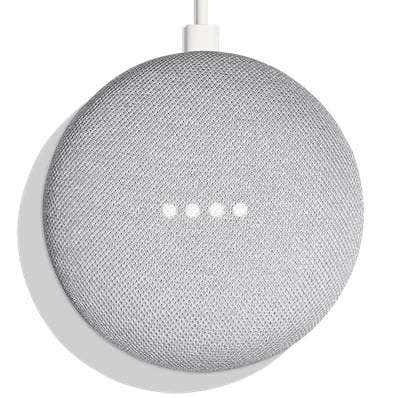
The Google Home Mini is the smallest and most affordable of Google’s smart assistants. In fact, it often goes on sale for $30. If you’re just starting out with smart home technology—or you just need a smart assistant in another room—the Google Home Mini is well worth it.
The speaker is not as loud or as high-quality as the more expensive offerings and comes with a distinct tinny sound, but it is perfectly loud enough to fill a room if you aren’t picky about audio quality. There are also multiple color options, so you’re sure to find a device that fits the look and feel of your space.
Google Home
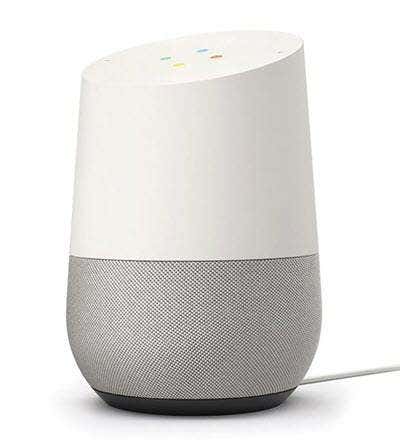
The Google Home is the original smart home assistant that Google produced. Priced at $129, it has better sound quality and a more sleek look than the round, button-like Mini. It’s louder and has a much better baseline overall, but has the same functionality as the Mini.
The Google Home comes in multiple colors, but also has the aesthetic of an air freshener. While some people like the look, it isn’t for everyone.
Google Home Max
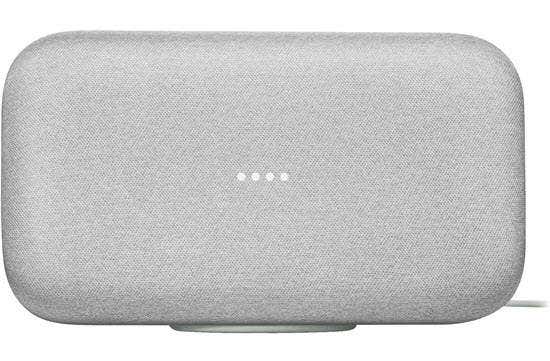
The Google Home Max is by far the most expensive option on the list, but for good reason. Google took all of the functionality of the other devices and stuffed it into the Max, but added speakers any audiophile will love.
If you intend to use Google Home mostly as a way to play music, the Max might be the right option for you. It boasts dual 4.5″ woofers and has clear tweeters to keep the high notes high and the low notes low.
Reviews say that no other speaker on the market sounds as good as the Google Home Max. The device even looks like a speaker. For the average person that only wants to control a smart home, the Max might be more than you need—but for anyone with a deep love of music, the Max will be right at home.
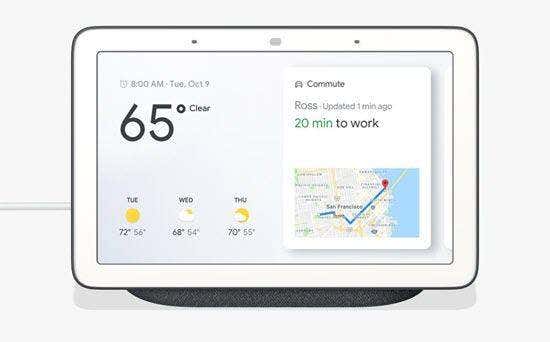
Google Home Hub
Of all the available Google Home devices, the Home Hub would be our primary pick for a smart home device. It boasts all the functionality of the Mini, the Home, and the Max, but adds something else to the mix: a screen. The Google Home Hub is equipped with a touch screen display that gives you visual access to Google Photos, Google Maps, and a host of smart home controls.
The Home Hub can be used as a digital photo frame when not actively in use by someone in the home. You can watch YouTube, look up recipes, and much more. As a centerpiece in the home—particularly in the kitchen, where the step-by-step recipe instructions are most useful—the Home Hub is without peer.
At $149, it’s half the price of the Max and only $20 more than the basic Google Home assistant. Its versatile functionality, clean look, and integration with smart home devices like the Nest Hello make it a solid choice for anyone that wants to upgrade their home.
Amazon Echo
The Amazon Echo is evenly matched against the Google Home when it comes to smart home control, but excels in one area in particular: shopping. Because the Echo is a property of Amazon, users can order products directly through the smart assistant. There are four different versions of the Amazon Echo.
| Model | Price |
| Amazon Echo Dot | $49.99 |
| Amazon Echo | $99.99 |
| Amazon Echo Plus | $149.99 |
| Amazon Echo Show | $229 |
Amazon Echo Dot
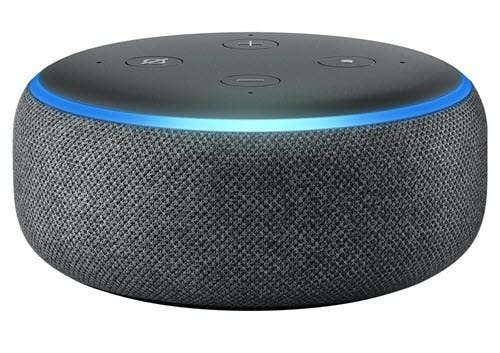
The Amazon Echo Dot is Amazon’s analog of the Google Home Mini. The device is a smaller—yet fully featured—version of the basic Amazon Echo. Like the Echo, it answers to Alexa (or Echo.) The Echo Dot can play music, start up your favorite show on the television, control your lights, and much more.
Amazon markets the Dot as an “Alexa-enabled” Bluetooth speaker. The device started out as a home for the Alexa, but Amazon has since put more focus on the speaker aspect. You can pair two Dots together for stereo sound within a space, or you can use a 3.5 mm audio cable to connect your own speakers to the device.
Amazon Echo
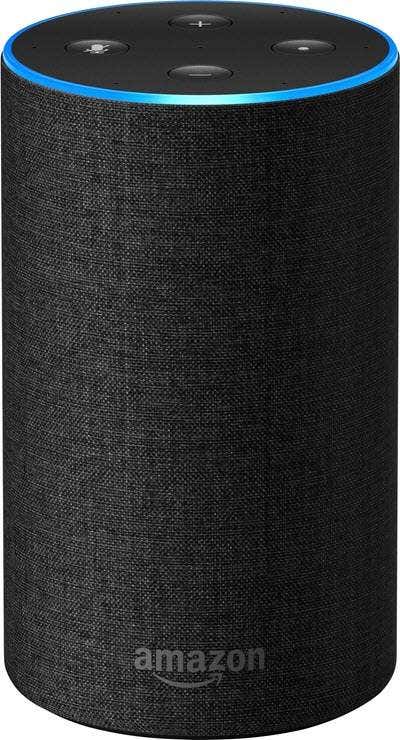
The Echo is the original smart assistant. While other devices may have existed before it, none caught on with the same level of popularity as the Echo.
It has the same functionality of the Dot, but with better hardware and a more aesthetic case. If that sounds familiar, it’s because the system is just like that of the Google Home—or perhaps the Google Home is just like that of the Amazon Echo.
The Amazon Echo makes use of Dolby technology to power its speakers and distribute audio evenly over a 360-degree area. Seven built-in microphones mean the Echo can hear you from anywhere, even if music is playing.
Amazon Echo Plus
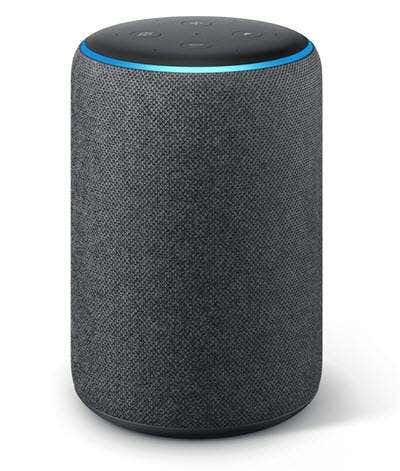
The Echo Plus is Amazon’s equivalent to the Google Home Max. Built with a 3″ woofer and a 0.8″ tweeter, the Echo Plus has the most audio capability of any of the Echo devices, but is not as powerful as the Google Home Max. However, with a price point of just $119, the Echo Plus gives mid-level sound for a fraction of the cost.
You can also run a 3.5 mm audio cable into the Echo Plus and use it as a speaker to play music from another device, a feature that none of the other Echo devices have. The Echo Plus only has three color options: Charcoal, Sandstone, and Heather Grey.
Amazon Echo Show
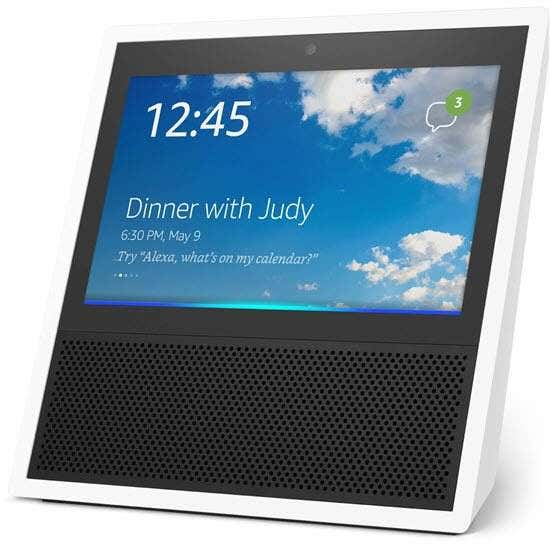
The Amazon Echo Show is the newest addition to the Echo lineup. The Echo Show has a 10.1″ touchscreen that lets you stream live TV, Hulu, check out recipes, and see album art from your Amazon Music collection. You should note, however, that it does not have YouTube due to the rivalry between Amazon and Google.
You can connect the Echo Show to a smart doorbell and see who’s at the door, and also stream two-way audio. The Echo Show also has video and hands-free calling, something the Google Home lacks.
Apple HomePod
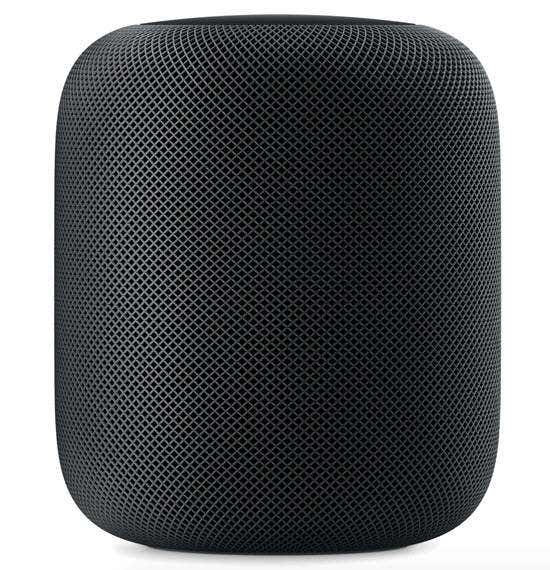
The Apple HomePod is Apple’s attempt to get into the smart assistant market, but doesn’t quite stack up to the competition. At present, there is only a single model available for the HomePod.
| Apple HomePod | $349 |
The HomePod comes in two colors: black and white. While the HomePod does work as a smart assistant, it’s primarily a speaker. It has six built-in microphones for voice detection, which means Siri should be able to hear you no matter how loud you have the music turned up.
It also has seven horn-loaded tweeters and a high-excursion woofer. When it comes to audio quality, it’s hard to beat the HomePod. It gives even the Google Home Max a run for its money.
Siri doesn’t have the same functionality as either Alexa or Google. While she can search for answers to questions, she usually only provides a website with a search result.
Smart home compatibility is also limited. While most of the major name brands will work with Siri (after you set up the apps), some of the more obscure brands might pose a problem.
Apple HomeKit provides interesting options for scheduling routines, but you don’t need a HomePod for that. Unless you are looking for a smart home assistant that has truly amazing sound quality, an iPhone or iPad will give the same smart home control a HomePod will.
Comparing the Assistants
We’ll start by saying this: if you want great sound quality and aren’t worried about smart home technology, go for the HomePod. It excels at audio, but doesn’t add up anywhere else. If you want a mix of the two, then it boils down between Amazon Echo and Google Home devices.
Echo Functionality
All Amazon Echo devices are powered by Alexa. At present, Alexa has more than 50,000 Skills, with more added every day. You can even create your own Alexa Skills with the Skill Blueprints, easy-to-use templates that allow you to set up a series of commands tied to a specific phrase.
The downside lies in actually speaking with Alexa. A lot of updates have improved both the overall quality of her voice and the range of questions she can answer, but Alexa still sounds distinctly robotic. If you ask a question, she won’t remember the previous question. For example, if you ask, “Alexa, what was the number one film of 2018?” she will give you the proper answer (it’s Black Panther, by the way.) But if you follow up and ask, “Who was the leading actor?” she will be confused.
Google Functionality
The Google Home is easy to set up and install, but the skills it comes with are what you get. Google does not have the same Skills Blueprints that Alexa does, which means you can’t create custom commands.
On the other hand, speaking with Google sounds much more natural. The Google voice has more natural inflection. Google will also remember the questions you’ve asked previously. To reuse the above example, if you asked “Who was the leader actor?” Google would respond with “Chadwick Boseman.”
Screens or No Screens?
If there are no other circumstances, go for one of the devices with a screen. It expands the overall functionality of the smart assistant to never-before-seen levels that will make it a part of your routine.
The sound quality on the Amazon Echo Show and the Google Home Hub may not be the level of the HomePod, but it’s more than enough to hear what the devices say and listen to some background music.
The Recommendation
When all is said and done, the Amazon Echo Show is the most bang for your buck. While pricier than the Google Home Hub, it also has a much broader range of functionality.
Both can show recipes, both can play music, but the Echo Show lets you shop, access your calendar, and even create custom commands to fit need you may have of it.